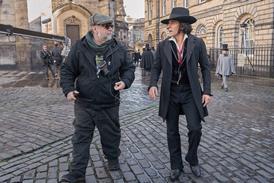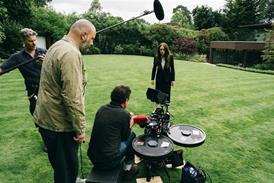Director/star Bradley Cooper conducts an impressively-mounted, if uneven, portrait of composer Leonard Bernstein

Dir. Bradley Cooper. US. 2023. 129 mins
A portrait of a marriage sits uncomfortably alongside the picture of a man in Bradley Cooper’s Maestro, which addresses the union of the bisexual conductor and composer Leonard Bernstein (Cooper) with actor Felicia Montealegre Cohn (Carey Mulligan). If her complaint was that the charming extrovert she knowingly married sucked the air out of every room he entered, the crime is repeated here: all eyes are on Cooper who holds, like Bernstein, the audience in the palm of his hand. An upscale, often sprightly story of talent and turmoil, this long-gestating project will draw attention in its awards season release: it is the very definition of an American prestige project for Netflix. Their marriage was unequal, and so is the film, but Maestro is honest about the larger-than-life flaws of its central character, and Cooper is impressive in the role.
Cooper’s performance can only rival last year’s Oscar contender Cate Blanchett in Tar
Supported by the couple’s three children, Maestro is told in blocks; a choppy sensation reinforced by relating early chapters in black-and-white and moving the aspect ratio around (it shot on film). In the beginning, there is stylised on-with-the-show madcap energy with young 25 year-old Leonard jumping from the bed he shares with musician David Oppenheim (Matt Bomer) and onto the Carnegie Hall stage to suddenly conduct his first concert. It could have come from one of Bernstein’s ballet/Broadway/Hollywood productions - ‘Fancy Free’, for example, which became On The Town (1945) After meeting and falling in love with the half-Chilean Felicia, they dance together in a dreamlike version of this show, but it is the film’s only integrated musical number. (There’s nothing of West Side Story, although Candide and Mass are represented.)
Which is to say that Maestro plays like a more modern work: a staccato piece. The black-and-white section at the start is the most joyous, carefree and flowing; central parts, where the marriage starts to fracture despite Felicia being happy to entertain her husband’s lovers, are loud, veering towards abrasive; the final third, with depression and illness, feels like a slow, painful thud to fade. Maestro does not describe itself as a biopic but that is the way it often comes across due to the strength of Bernstein/Cooper’s charisma. Much in the same way as Bernstein began to feel the marriage restrained him, the portrait of this union also holds the film back from exploring other angles of his life. It would be less unbalanced, perhaps, if Felicia was more powerful in the film, or held more agency, but she isn’t, and she didn’t. It’s Cooper’s show.
Much has been made of Cooper using a prosthetic nose for his performance, deemed to be potentially offensive to Jews (although, oddly enough, Helen Mirren seems to have got away with hers in Golda earlier this year). It is a device which is more distracting in the early parts of the film, where Cooper and Bernstein are similar in age and the nose seems more grafted on. But the film spans 40 years and, in later sections, the transformation becomes more complete across his entire face, with prosthetics helping him into a performance at the podium which is eerily incarnate (a recreation of his Mahler concert at Ely Cathedral in Cambridge).
Cooper also nails the overwhelming charm of a man who “loved people”, and who never wanted to be alone – a grand seducer, a serial lover, unfaithful, hard to pin down. “I slept with both your parents,” he tells an uncomprehending infant. “I love too much.” Then, “I’m feeling sad,” he tells Felicia, which seems to be shorthand for years of crushing depression. He starts out running from set to set, from discipline to discipline, with the sense that he’s the Great American – but what – composer? Conductor? Classical or theatre? Gay or straight? He wants it all – perhaps like Cooper himself, who produces, directs, stars in and co-writes Maestro after his overwhelming success with A Star Is Born. Ultimately Bernstein decides to ‘live my life the way I like’ which involves safari suits, cocaine and a sportscar with the licence-plate ‘Maestro1’. “He’s ageing horribly,” says Felicia, accurately.
While the style decisions don’t always pay off – the black-and-white is replaced by an over-saturated 1970s aesthetic – Maestro is always gorgeously-mounted. The film shot in New York and Connecticut, using the Bernstein’s house there, and musical/Broadway rights are extensive. The New York Met’s musical director Yannick Nézet-Séguin serves as advisor, meaning not just an accuracy in the way Cooper conducts, and conducts himself, but also in the glorious way his music is used throughout. (Cooper’s performance can only rival last year’s Oscar contender Cate Blanchett in Tar, and seems to be heading in the same direction.)
If Maestro leaves the audience wanting to know more about Bernstein, that’s no bad thing – apart from the men and the music, he was a social activist, a humanist and a gospel of classical conductors, particularly Mahler. He was even more than he seems on screen here, and that’s a lot: his life could certainly bear another film, now the marriage is out of the way.
Production companies: Siklelia Productions, Ambling Entertainment
Worldwide distribution: Netflix
Producers: Martin Scorsese, Bradley Cooper, Steven Spielberg, Fred Berner, Amy Durning, Kristie Macosko Krieger
Screenplay: Bradley Cooper, Josh Singer
Cinematography: Matty Libatique
Production design: Kevin Thompson
Editing: Michelle Tesoro
Music Leonard Bernstein
Music consultant: Yannick Nézet-Séguin
Main cast: Carey Mulligan, Bradley Cooper, Matt Bomer, Maya Hawke, Sarah Silverman, Josh Hamilton, Scott Ellis, Gideon Glick, Sam Nivola





















